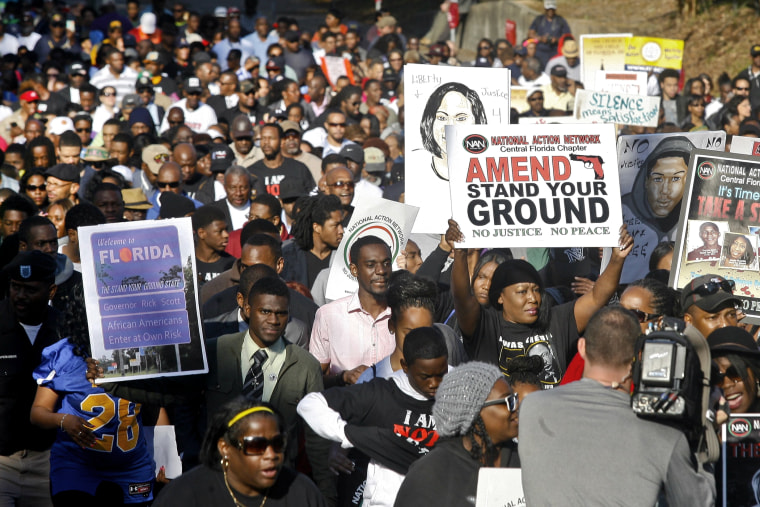Civil rights activists took to the streets of Tallahassee Monday to march against what they called "unjust" stand-your-ground laws at a rally joined by the families of Trayvon Martin and Jordan Davis outside the Florida State Capitol.
"Florida is ground zero for a sick and wicked law," Rev. Al Sharpton said during the rally, where he joined Florida Democratic Rep. Corrine Brown and National Organization for Women President Terry O'Neill.
"To have a law that says that if you think you are threatened--doesn't have to be an actual threat--but if you think you are threatened, you have no obligation to retreat and you can use deadly force, means that we have now legislated in this state and over 20 other states, that our children can be killed based on the imagination of someone," Sharpton said. "That is an unjust and wicked law."
Many speakers highlighted the deaths of unarmed African-American teenagers Trayvon Martin and Jordan Davis, which did not lead to murder convictions. While the stand your ground law was not directly applied in either case, language from the legislation made it into the jury instructions in both trials. George Zimmerman was found not-guilty in the shooting death of Martin last July, while the jury in the Dunn trial deadlocked on the murder charge for Davis' death earlier this year. Prosecutors from State Attorney Angela Corey's office plan to retry Dunn on the charge of first degree murder.
Marchers also took issue with the law for what they consider an unfair application, highlighting Michael Giles and Marissa Alexander's stories as examples. A jury convicted former U.S. airman Michael Giles after he fired a shot in self-defense during a fight that erupted outside a nightclub in 2010. He is currently serving a 25-year sentence. Alexander was serving a 20-year sentence after being convicted of aggravated assault for firing what she described as a warning shot in the direction of her allegedly abusive estranged husband and two of his children, until a judge ordered a retrial for her late last year. If she is convicted on all three counts, she could face a 60-year sentence, even though no one was injured in the shooting.
"We must protect our young men and women so we will not have to see more unjustified killing like Trayvon Martin or Jordan Davis, or unfair and arbitrary sentencing for victims like Marissa Alexander and Michael Giles," Patricia Rosier, president of the National Bar Association said during her remarks. "The law is wrong and it is being used as a weapon against our communities. The law protects the bully and blames the victim."
National Organization for Women President Terry O'Neill specifically focused on Alexander's case during her remarks, launching a strong attack on Corey, Florida's state attorney, for what she described as a "racist and misogynistic interpretation" of the law. Corey prosecuted Alexander's case, along with those of Trayvon Martin and Jordan Davis' killers, and has taken heat in recent weeks after the revelation that Alexander faces a possible 60-year sentence.
"The National Organization for Women is calling on Angela Corey to resign," O'Neill said to cheers from the rally audience. "And we say to prosecutor Corey: Not only should you resign, you need to stay out of public office for 60 years. Twenty years for Trayvon, 20 years for Jordan, 20 years for Marissa."
The marchers say they have decided to focus their efforts on Florida because that is where the law began.
"It started in Florida, and we come to start the end of it in Florida," Sharpton said.
Gov. Jeb Bush became the first to sign a “stand your ground” style law in 2005, which passed the legislature with strong support from the NRA. Nearly two dozen states have followed suit in the years since, passing similar but not necessarily identical laws.
Florida lawmakers rejected an attempt to repeal the law in its entirely after legislation was introduced in subcommittee last November. Democratic State Sen. Chris Smith has begun working on legislation to modify the law, thinking changes may be more politically realistic than a full repeal. The bill would make it harder for the aggressor in an argument to invoke the stand your ground immunity, and would institute changes to neighborhood watch group guidelines.
"I've been working for its repeal but that's not likely to happen in Florida so I've teamed up with a Republican colleague to try to put some common sense back into the bill," Smith told Rev. Sharpton during an appearance on PoliticsNation last week.
